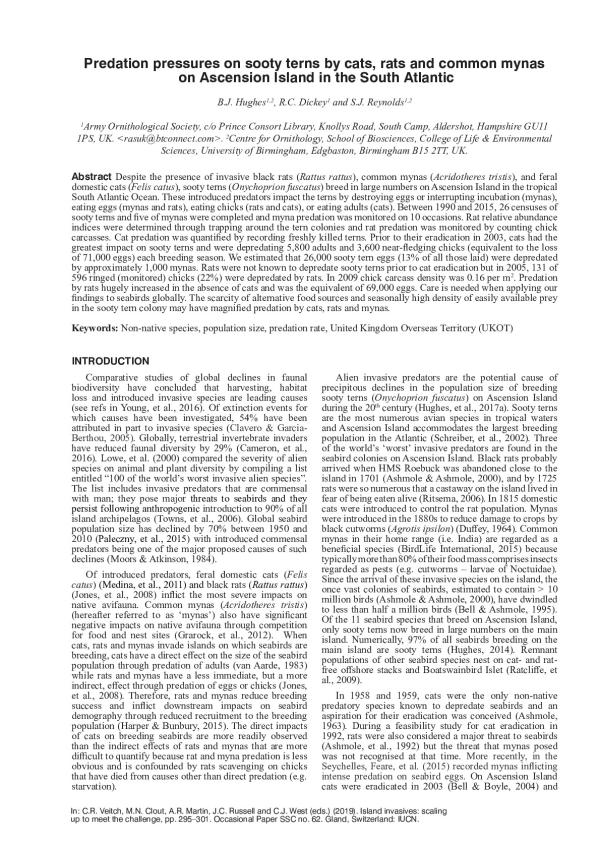Localisation
SPREP LIBRARY
Éditeur
International Union for Nature Conservation (IUCN)
Année de publication:
2019
Lieu de publication
Gland, Switzerland
Description physique:
7 p.
Numéro d'appel
[EL]
Type de contenu
Langue
English
Identifiant de dossier:
684
Ancien numéro d'identification PEIN:
82626
Notes générales
Available on line, Island invasives: scaling up to meet the challenge, pp. 282288. Occasional Paper SSC no. 62. Gland, Switzerland: IUCN.
Disponible en ligne
Rubrique(s) thématique(s)
Invasive species
Résumé
Despite the presence of invasive black rats (Rattus rattus), common mynas (Acridotheres tristis), and feral domestic cats (Felis catus), sooty terns (Onychoprion fuscatus) breed in large numbers on Ascension Island in the tropical South Atlantic Ocean. These introduced predators impact the terns by destroying eggs or interrupting incubation (mynas), eating eggs (mynas and rats), eating chicks (rats and cats), or eating adults (cats). Between 1990 and 2015, 26 censuses of sooty terns and five of mynas were completed and myna predation was monitored on 10 occasions. Rat relative abundance indices were determined through trapping around the tern colonies and rat predation was monitored by counting chick carcasses. Cat predation was quantified by recording freshly killed terns. Prior to their eradication in 2003, cats had the greatest impact on sooty terns and were depredating 5,800 adults and 3,600 near-fledging chicks (equivalent to the loss of 71,000 eggs) each breeding season. We estimated that 26,000 sooty tern eggs (13% of all those laid) were depredated by approximately 1,000 mynas. Rats were not known to depredate sooty terns prior to cat eradication but in 2005, 131 of 596 ringed (monitored) chicks (22%) were depredated by rats. In 2009 chick carcass density was 0.16 per m2. Predation by rats hugely increased in the absence of cats and was the equivalent of 69,000 eggs. Care is needed when applying our findings to seabirds globally. The scarcity of alternative food sources and seasonally high density of easily available prey in the sooty tern colony may have magnified predation by cats, rats and mynas.
Localisation
SPREP LIBRARY
Éditeur
International Union for Nature Conservation (IUCN)
Année de publication:
2019
Lieu de publication
Gland, Switzerland
Description physique:
7 p.
Numéro d'appel
[EL]
Type de contenu
Langue
English
Identifiant de dossier:
684
Ancien numéro d'identification PEIN:
82626
Notes générales
Available on line, Island invasives: scaling up to meet the challenge, pp. 282288. Occasional Paper SSC no. 62. Gland, Switzerland: IUCN.
Dossier créé: 21-Aug-2019
Dossier modifié: 15-Feb-2022

